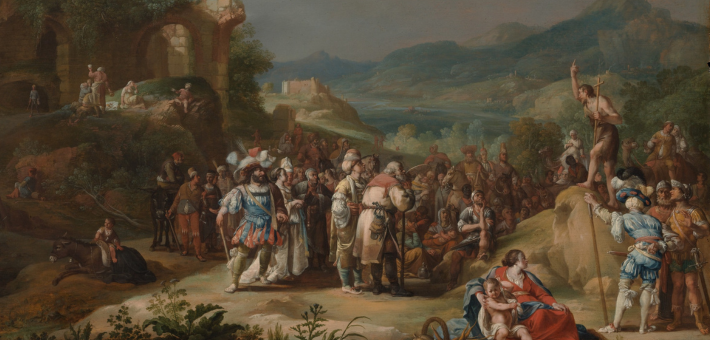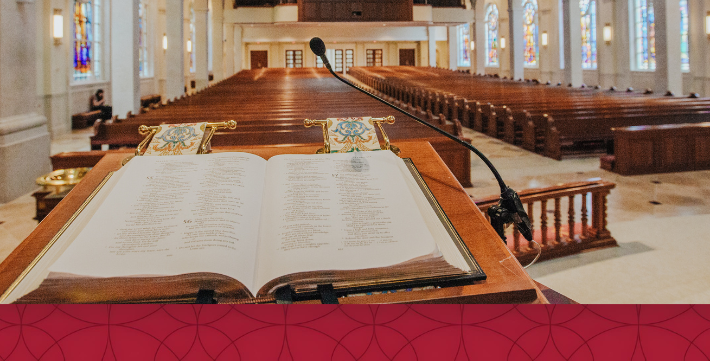Commentary on Luke 1:68-79
This is the second song that is sung in Luke’s story, and that matters.
Zechariah is the singer, and that matters as well, because he is the first person we meet in the story, and we meet him in the Temple. That matters, too.
The Temple held the Holy of Holies, a quiet, dark space understood to be the place where God’s finger touched the wildly spinning world and held it still. Gabriel meets Zechariah in that place (or at least very near to it), the holy place that functioned as the guarantee of safety in a world full of dangerous enemies. Gabriel meets Zechariah there with a promise: Elizabeth and Zechariah will welcome a son. But not just any son.
The child that will be born will be full of the breath of God, filled even from his first breath after being born. The child will return the host of Israel to the God whose Name is Mercy. When people see him, they will remember Elijah because he will knit families back together, parents to children, the whole host doing justice, prepared for the God whose Name is Mercy.
That was Gabriel’s promise. Zechariah pointed out a basic biological fact: Really old people do not beget or bear children. As a result, Zechariah has been held silent since that moment. Until he sings this song. That matters.
It also matters that Mary was the second person to meet Gabriel, who comes to her in the midst of her everyday life. After Zechariah went home, silent, Gabriel came to Mary and acted out the second angelophany in Luke’s story. The basic pattern is the same as it was for Zechariah, the same as it is for all the angelic appearances in Jewish Scripture:
- A person is going about their ordinary activities;
- An angel suddenly appears;
- The person is scared spitless;
- The angel speaks their required line: “Be not afraid”;
- The angel delivers a message and vanishes.
- That’s how it went with Zechariah in the Temple. That’s how it went with Mary.
Almost.
The storyteller does not say that Mary was afraid. To be sure, Gabriel tells her not to be afraid, but it’s like he’s delivering his line because he has to. The storyteller carefully omits any mention of fear on Mary’s part, describing her actions instead with words that imply careful and competent analytical thought. This matters, perhaps most of all.
After Mary has chosen to take on the task of giving birth to the one who will be given the throne of David (Gabriel’s promise), she runs to the hill country of Judea to her auntie, Elizabeth. Zechariah is still silent, so the scene that plays out involves only Elizabeth and Mary with speaking roles. Mary, in fact, sings, which is always a significant act. Poetry and music deepen the impact of what is said. And that is certainly the result of what Mary sings.
Gabriel had promised she would give birth to a king. Mary sings that God is acting to turn the world right-side-up: those who are oppressed will be lifted up, and those who are hungry will be filled with good things. Those with power and privilege will get a chance to experience poverty and emptiness, just in case those conditions are as morally instructive as they have always said they were. And Mary ties all of this into the promises made to God’s people, beginning with Abraham. Her song takes Gabriel’s words and expands them, giving them more specificity and greater historical depth.
And then she goes home, pregnant and powerful.
After Elizabeth gives birth, and when it is time for the story to stop so John can be circumcised, when the gathered family won’t accept that Elizabeth knows what to name her son, Zechariah confirms what she has said and recovers his voice. He sings. And his song reveals that during his silence he was listening to Mary as she sang. His song goes far beyond what Gabriel had promised, but his song is clearly aware of what Mary had sung. Mary recognized the enemies surrounding God’s people. So does Zechariah. Mary sang of the God whose Name and actions amount to Mercy. So does Zechariah. Mary links all of this eruption of divine activity to the promises made to God’s people all the way back to Abraham. So does Zechariah.
All of this matters in the story Luke is telling. It is a story full of memory and promise. It is a story that reminds us that dangerous enemies are real, but that we face them in the company of family. When Mary takes on the task of being untimely pregnant in order to bring the Messiah into the world, she knows there might be members of her family who will see this as an offense against the family’s “honor.” This puts her at risk of being the victim of the loathsome ancient practice (still in evidence in our world, in fact) of “honor-killing.” So she runs to the protection of her auntie Elizabeth, an eminence in the story whom no one would challenge.
When the threat comes from family members obsessed with “honor,” power, and patriarchy, the auntie in the story turns things right-side-up again. When the people of God are surrounded by enemies, the family finds its courage in memory and promise. And the storyteller emphasizes all this by having Zechariah listen to his young kinswoman Mary and pick up the song that she sang first. Clearly, this is a family in which the hearts of the old are turned to the young, and vice versa. Such families can rise up out of disasters and despair.
This matters because Luke’s story is told in the aftermath of the crushing of the first Jewish revolt against Rome (66–74 CE). The enemies were not imaginary; they were the Roman legions that exercised brutal power in the land of promise.



December 8, 2024